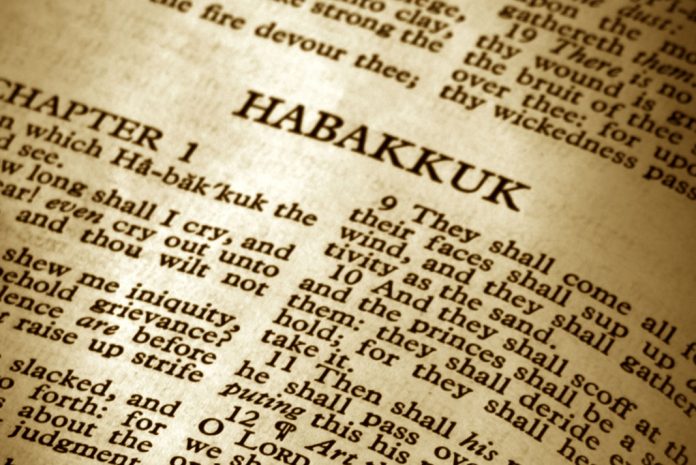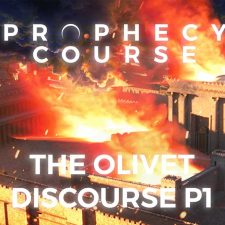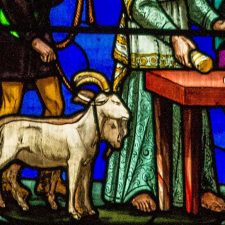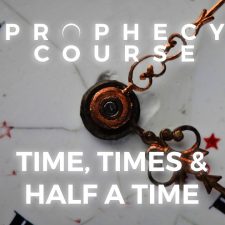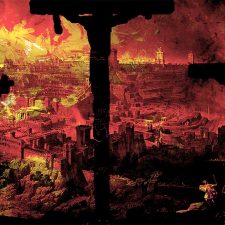Most Christians, when they hear the word ‘Habakkuk,’ can quote parts of Habakkuk 3:17-18:
“Though the fig tree does not bud
and there are no grapes on the vines,
though the olive crop fails
and the fields produce no food,
though there are no sheep in the pen
and no cattle in the stalls,
18 yet I will rejoice in the Lord,
I will be joyful in God my Savior.”
But did you know that there is so much more to the book Habakkuk?
This blog aims to open your eyes to another part of this exceptional Bible book that has a profound message for Christians today.
Who was Habakkuk?
Little is known
Unfortunately, little is known about this prophet. We do know that he was a contemporary of Jeremiah and a man of deep faith. In the book of Habakkuk, the coming Babylonian invasion is predicted, so we can safely say that Habakkuk lived around 600 BC.
(A commentary on the first two chapters of Habakkuk was found among the Dead Sea Scrolls, which shows that the book was popular already during the intertestamental period.)
A unique Bible book
The book itself is unique. It is a dialogue between God and the Habakkuk.
In the first two chapters, Habakkuk argues with God – “Why are your ways so unfathomable?”
He receives an answer and responds with a faith declaration in chapter three, containing the words we all know so well.
The conversation
Habakkuk’s wrestling with God was not supposed to be private.
The book was composed for Israel – to answer the questions of those who were doubting God. God told Habakkuk that he was going to do something – He was going to send in the Chaldeans.
“Why?” Habakkuk asked. “Because my people are immoral,” God answered.
Habakkuk understood this, but then he digs up an argument that withstood the ages and one that some of us may even ask in today’s day and age:
“But God, the Chaldeans are far greater sinners! They are guiltier in terms of bloodthirstiness and oppression. You should punish them! Yes, our nation might be immoral, but these people, they are pure evil!”
A bigger plan
God answered Habakkuk and made it clear that the corrupt destroyer will also be destroyed in the end. Habakkuk (and we) must wait patiently in faith on God. He is sovereign in His doing and righteousness.
Let’s focus on a bit of God’s conversation with Habakkuk:
Habakkuk 2 verses 1-4
“I will stand at my watch
and station myself on the ramparts;
I will look to see what he will say to me,
and what answer I am to give to this complaint.
2 Then the Lord replied:
“Write down the revelation
and make it plain on tablets
so that a herald may run with it.
3 For the revelation awaits an appointed time;
it speaks of the end
and will not prove false.
Though it lingers, wait for it;
it will certainly come
and will not delay.
See, the enemy is puffed up;
his desires are not upright—
but the righteous person will live by his faithfulness.”
There are a quite few insights that can be gained from these verses.
“I will stand at my watch.”
A quiet tower
If we call ourselves Christians, we must be willing to go to our ‘tower’ and allow God to teach us, just as he did Habakkuk.
Are you troubled? Wait on the Lord and on what He is saying.
We can know so much more – if only we are willing to listen to God’s whispers! We often don’t hear anything, because there is so much worldly ‘noise’ around us.
God speaks! He speaks to us in His provision every day. He speaks in good times and in bad, in happiness and grief – but only to those with their ears open on their watch-towers.
Real children of God are alert and sit at His feet.
Do you do this enough?
I know I don’t.
We don’t read the Word searchingly; we don’t pray over it. We often proclaim things of our own inventions, not based on what God really said.
Charles Spurgeon wrote beautifully about this. He wrote that we must, “get away to our watch-towers, wrestle with the angel by the brook Jabbok, or go to the top of our mount Carmel.”
“Cry unto the Lord!” he wrote. “Cry, …unto Lord until the heavens are covered with clouds, and the thirsty earth is refreshed with rain.”
“I will look to see what He will say to me.”
Mingled senses
Did you pick up on the first reading of this passage how the different senses are mingled in this verse?
“I will look to see what He is saying.”
When God speaks, we can hear with our eyes, as well as our ears.
There is something magical here, an inner sense that sees the meaning of God’s words. No wonder then, that a prophet was often called ‘a seer.’ We, as saved children of God, must also learn to see.
“Write down the revelation.”
Get it out there!
God does not give us treasure from His Word or from our quiet time just for ourselves. He wants others also to be enriched with it.
Perhaps you were made to see something so that you can make others see also—someone who writes addresses a broader audience. If God speaks to you, make it known to others.
Writing on flesh
‘Write it down’ does not necessarily mean with a pen. Perhaps you have the special gift to write upon someone’s inmost soul and ‘write’ your words with the power of the Holy Spirit. The truth will be engraved deeply in memory, perhaps only to be used later.
“So, a herald may run with it.”
The message concerns you directly
If you are to receive a message that tells you your house is on fire, won’t you run as soon as you receive it? It is a message that concerns you directly. This is the meaning of this passage here in Habakkuk. God’s message is worth running for!
Charles Spurgeon wrote that he wishes he could always preach this way – so that a man would literally run for his life, away from destruction and toward the glories of Heaven!
Our message must be that if someone hears the good news, he will run toward his Savior and the haven of eternal life. There is no room for ambiguity. It is something to think and pray about!
“It speaks of the end …”
Every knee will bow
The glory of God’s message lies in the future. People often disregard what God is saying because they don’t see results in the there and now.
This is the sieve – the way how God discerns between His people and the wicked.
Someone might say: “Just look at that Christian! What good has his faith bring him? Nothing! We are the same. I just as well might not believe.”
The Christian says: “What God says is true. It will be fulfilled. I will wait. I will trust in Him and watch for the unfolding of his purpose.”
Conclusion
The book of Habakkuk gives us much to think about. In this blog, we only looked at parts of four verses!
It circles back to the richness and the wealth that we can find if we delve into the Word!
Why don’t you make Habakkuk your next Bible study for reflection? There are many more treasures to be found.
My name is Helena Bester. I’ve been writing stories and poems my whole life, but only recently discovered the wonderful world of freelance writing.
I love Jesus – He has been a constant presence in my life thus far. I try to sit at His feet – but often fail so miserably. Luckily, He still loves me, no matter what!
My greatest hope is to be honest in my Christian blogs and to be a vessel that God can use.
When I am not writing, I cook, read, or work in my vegetable patch. I am married to Hennie, a South African wheat farmer, and we have three beautiful children, Christiaan, Hendrie, and Jana.
Resources
https://www.biblica.com/resources/scholar-notes/niv-study-bible/intro-to-habakkuk/
https://www.biblegateway.com/passage/?search=Habakkuk+3&version=NIV
https://www.preceptaustin.org/spurgeon_on_habakkuk



